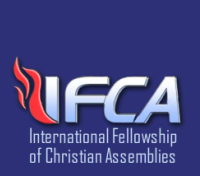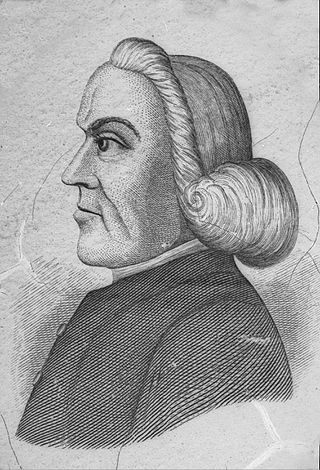Baptists form a major branch of evangelical Protestantism distinguished by baptizing only professing Christian believers and doing so by complete immersion. Baptist churches generally subscribe to the doctrines of soul competency, sola fide, sola scriptura and congregationalist church government. Baptists generally recognize two ordinances: baptism and communion.

A creed, also known as a confession of faith, a symbol, or a statement of faith, is a statement of the shared beliefs of a community in a form which is structured by subjects which summarize its core tenets.

Presbyterianism is a Reformed (Calvinist) Protestant tradition named for its form of church government by representative assemblies of elders. Though there are other Reformed churches that are structurally similar, the word Presbyterian is applied to churches that trace their roots to the Church of Scotland or to English Dissenter groups that formed during the English Civil War.
Christian fundamentalism, also known as fundamental Christianity or fundamentalist Christianity, is a religious movement emphasizing biblical literalism. In its modern form, it began in the late 19th and early 20th centuries among British and American Protestants as a reaction to theological liberalism and cultural modernism. Fundamentalists argued that 19th-century modernist theologians had misunderstood or rejected certain doctrines, especially biblical inerrancy, which they considered the fundamentals of the Christian faith.

The Wisconsin Evangelical Lutheran Synod (WELS), also referred to simply as the Wisconsin Synod, is an American Confessional Lutheran denomination of Christianity. Characterized as theologically conservative, it was founded in 1850 in Milwaukee, Wisconsin.
A Christian denomination is a distinct religious body within Christianity that comprises all church congregations of the same kind, identifiable by traits such as a name, particular history, organization, leadership, theological doctrine, worship style and, sometimes, a founder. It is a secular and neutral term, generally used to denote any established Christian church. Unlike a cult or sect, a denomination is usually seen as part of the Christian religious mainstream. Most Christian denominations refer to themselves as churches, whereas some newer ones tend to interchangeably use the terms churches, assemblies, fellowships, etc. Divisions between one group and another are defined by authority and doctrine; issues such as the nature of Jesus, the authority of apostolic succession, biblical hermeneutics, theology, ecclesiology, eschatology, and papal primacy may separate one denomination from another. Groups of denominations—often sharing broadly similar beliefs, practices, and historical ties—are sometimes known as "branches of Christianity". These branches differ in many ways, especially through differences in practices and belief.

The Church of the Lutheran Brethren of America (CLBA) is a Lutheran denomination of Christians rooted in a Pietist Lutheran spiritual awakening at the turn of the 20th century.

The International Fellowship of Christian Assemblies (IFCA), formerly known as the Christian Church of North America (CCNA), is a North American Pentecostal denomination with roots in the Italian-American community, but is now a multicultural denomination. Central offices are located in Transfer, Pennsylvania. Ministries of the church include Benevolence, Home Missions, FOCUS, Foreign Missions, Education, Lay Ministries, and Public Relations. A convention is held annually, and their official publication is Vista, a quarterly magazine.

The Welsh Methodist revival was an evangelical revival that revitalised Christianity in Wales during the 18th century. Methodist preachers such as Daniel Rowland, William Williams and Howell Harris were heavily influential in the movement. The revival led eventually to the establishment of the Welsh Calvinistic Methodists as a denomination and it also revitalised older dissenting churches.

The Presbyterian Church of Wales, also known as the Calvinistic Methodist Church, is a denomination of Protestant Christianity based in Wales.

Universities and Colleges Christian Fellowship is a UK-based charity that was founded in 1928 as the Inter-Varsity Fellowship of Evangelical Unions. The UCCF endorses a conservative evangelical form of Christian theology.
Robert Tudur Jones, better known as R. Tudur Jones, was a Welsh nationalist and one of the country's leading theologians. His nationalistic stance, combined with Calvinist doctrine, created an integrated vision that was significant to the religious life of Christian Wales in the later half of the 20th century.

The Apostolic Church is an international Christian denomination and Pentecostal movement that emerged from the Welsh Revival of 1904–1905. Although the movement began in the United Kingdom, the largest national Apostolic Church became the Apostolic Church Nigeria. The term "Apostolic" refers to the role of apostles in the denomination's church government, as well as a desire to emulate 1st century Christianity in its faith, practices, and government.
Christian unions (CUs) are evangelical Christian student groups. They exist in many countries and are often affiliated with either the International Fellowship of Evangelical Students or the Campus Crusade for Christ. Many Christian unions are one of the societies affiliated to their universities' students' union. As a broader term, Christian union may refer to any Christian student society, such as SCM and Fusion groups.
The National Association of Congregational Christian Churches (NACCC) is an association of about 400 churches providing fellowship for and services to churches from the Congregational tradition. The Association maintains its national office in Oak Creek, Wisconsin, a suburb of Milwaukee. The body was founded in 1955 by former clergy and laypeople of the Congregational Christian Churches in response to that denomination's pending merger with the Evangelical and Reformed Church to form the United Church of Christ in 1957.
The Conservative Congregational Christian Conference is a Congregationalist denomination of Protestant Christianity. It is based in the United States.
Christian universalism is a school of Christian theology focused around the doctrine of universal reconciliation – the view that all human beings will ultimately be saved and restored to a right relationship with God. "Christian universalism" and "the belief or hope in the universal reconciliation through Christ" can be understood as synonyms. Opponents of this school, who hold that eternal damnation is the ultimate fate of some or most people, are sometimes called "infernalists."
Lutheranism is a major branch of Protestantism, identifying primarily with the theology of Martin Luther, the 16th-century German monk and reformer whose efforts to reform the theology and practices of the Catholic Church launched the Protestant Reformation.

Ecclesiastical separatism is the withdrawal of people and churches from Christian denominations, usually to form new denominations.







